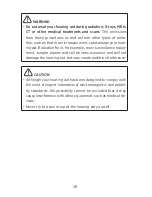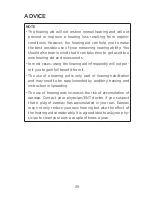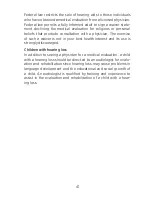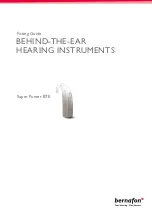
40
REGULATORY INFORMATION
Contraindications:
• Congenital or traumatic deformity of the ear
• Active drainage from the ear within 90 days
• History of rapid progressive hearing loss within previous 90
days
• Acute or chronic dizziness
• Sudden unilateral hearing loss in previous 90 days
Important notice for prospective hearing aid users
Good health practice requires that a person with a hearing loss
have a medical evaluation by a licensed physician (preferably a
physician who specializes in diseases of the ear) before purchasing
a hearing aid. Licensed physicians who specialize in diseases of the
ear are often referred to as otolaryngologists, otologists, or otorhi-
nolaryngologists. The purpose of medical evaluation is to assure
that all medically treatable conditions that may affect hearing are
identified and treated before the hearing aid is purchased.
Following the medical evaluation, the physician will give you a
written statement that states that your hearing loss has been med-
ically evaluated and that you may be considered a candidate for
a hearing aid. The physician will refer you to an audiologist or a
hearing aid dispenser, as appropriate, for a hearing aid evaluation.
The audiologist or hearing aid dispenser will conduct a hearing aid
evaluation to assess your ability to hear with and without a hear-
ing aid. The hearing aid evaluation will enable the audiologist or
dispenser to select and fit a hearing aid to your individual needs.
If you have reservations about your ability to adapt to amplifica-
tion, you should inquire about the availability of a trial-rental or
purchase-option program. Many hearing aid dispensers now of-
fer programs that permit you to wear a hearing aid for a period of
time for a nominal fee after which you may decide if you want to
purchase the hearing aid.

































